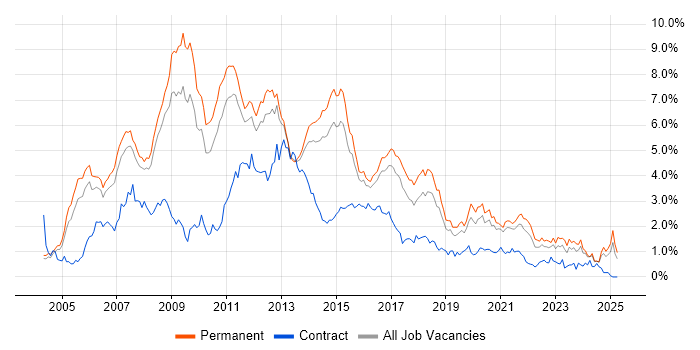C# Developer
West Midlands > Birmingham
The median C# Developer salary in Birmingham is £70,000 per year, according to job vacancies posted during the 6 months leading to 19 January 2026.
The table below compares current salary benchmarking and summary statistics with the previous two years.
| 6 months to 19 Jan 2026 |
Same period 2025 | Same period 2024 | |
|---|---|---|---|
| Rank | 89 | 115 | 81 |
| Rank change year-on-year | +26 | -34 | +38 |
| Permanent jobs requiring a C# Developer | 14 | 13 | 30 |
| As % of all permanent jobs in Birmingham | 0.79% | 0.72% | 2.04% |
| As % of the Job Titles category | 0.85% | 0.76% | 2.14% |
| Number of salaries quoted | 14 | 10 | 28 |
| 10th Percentile | £31,750 | - | £36,750 |
| 25th Percentile | £57,625 | £42,500 | £43,750 |
| Median annual salary (50th Percentile) | £70,000 | £51,250 | £50,000 |
| Median % change year-on-year | +36.59% | +2.50% | -16.67% |
| 75th Percentile | £77,500 | £58,750 | £55,000 |
| 90th Percentile | £78,750 | £59,125 | £60,000 |
| West Midlands median annual salary | £70,000 | £52,500 | £53,500 |
| % change year-on-year | +33.33% | -1.87% | -10.83% |
All Permanent IT Job Roles
Birmingham
For comparison with the information above, the following table provides summary statistics for all permanent IT job vacancies in Birmingham. Most job vacancies include a discernible job title that can be normalized. As such, the figures in the second row provide an indication of the number of permanent jobs in our overall sample.
| Permanent vacancies in Birmingham with a recognized job title | 1,646 | 1,700 | 1,399 |
| % of permanent jobs with a recognized job title | 93.10% | 94.55% | 95.11% |
| Number of salaries quoted | 1,194 | 833 | 1,188 |
| 10th Percentile | £30,000 | £37,500 | £31,000 |
| 25th Percentile | £41,250 | £43,750 | £41,250 |
| Median annual salary (50th Percentile) | £57,500 | £57,500 | £55,000 |
| Median % change year-on-year | - | +4.55% | -0.90% |
| 75th Percentile | £70,000 | £72,500 | £67,500 |
| 90th Percentile | £84,375 | £89,750 | £80,000 |
| West Midlands median annual salary | £50,000 | £52,500 | £49,000 |
| % change year-on-year | -4.76% | +7.14% | -6.67% |
C# Developer
Job Vacancy Trend in Birmingham
Historical trend showing the proportion of permanent IT job postings featuring 'C# Developer' in the job title relative to all permanent IT jobs advertised in Birmingham.

C# Developer
Salary Trend in Birmingham
Salary distribution trend for C# Developer job vacancies in Birmingham.

C# Developer
Salary Histogram in Birmingham
Salary distribution for jobs citing C# Developer in Birmingham over the 6 months to 19 January 2026.
C# Developer Skill Set
Top 30 Co-Occurring Skills & Capabilities in Birmingham
For the 6 months to 19 January 2026, C# Developer job roles required the following skills and capabilities in order of popularity. The figures indicate the absolute number of co-occurrences and as a proportion of all permanent job ads across the Birmingham region featuring C# Developer in the job title.
|
|
C# Developer Skill Set
Co-Occurring Skills & Capabilities in Birmingham by Category
The following tables expand on the one above by listing co-occurrences grouped by category. They cover the same employment type, locality and period, with up to 20 co-occurrences shown in each category:
